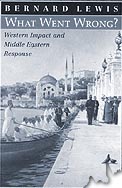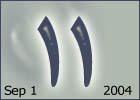Issue 11
Babak Layeghi
“Freedom is the right to tell people what they do not want to hear.”
George Orwell.
A couple of weeks back I came across Bernard Lewis’ book, What Went Wrong? The Clash Between Islam and Modernity in the Middle East. I decided to buy the book due to the title; I thought to myself, that maybe this book would shed some light on to why Islamic civilization had fallen behind the West, when at a time Baghdad was in the forefront of human achievement.
Although I was familiar with Bernard Lewis’ orientalist perspective I was still intrigued to read what he had to say about the demise of Islamic civilization. To put it shortly Lewis basically painted a glossy history of the rise of Islam from the time of the Prophet to its downfall under the Ottoman Empire. Lewis made no attempt to provide any real explanation as to what led to the downfall of Islamic civilization; instead he provided a mere chronology of the rise and fall of Islamic civilization. Only in his concluding chapter did he attempt to address the title of his book and he did this in a very poor manner. He simply stated that if Islamic civilization was strong enough it would have never allowed for the Mongols or the West to penetrate into its territories and dictate its political, social, and economic policies.

Nonetheless his book was not a total waste of time to read; as I came upon a great section where he discussed the Christianization of Islam, which I found to be interesting.
Lewis notes that there existed no clergy in the Christian sense in classical Islamic civilization. The notion that there exists a group of people in society that do not fall under the jurisdiction of Islam is unheard of to Muslims. Thus the term clergy cannot be a proper term to be used to describe those in Islam who are men of religion. Only over a period of time did these men of religion become to form an established institution and only then did they become a clergy in a sociological sense, yet they never became a clergy in the theological sense, argues Lewis. Since there is no priestly mediation between the believer and God in Islam, the clergyman is never seen as reciprocal to a priest in Christianity, but is rather looked upon as a teacher, a guide, and ultimately as a scholar of theology and law.

Hence, Lewis maintains that due to this notion the Islamic state could never be ruled by the clergy. One can conclude from this that classical Islamic civilization having no priesthood could never have had a theocratic government. One can see this notion in the office of the caliph. All power in the Islamic state rested with the caliph, and he was the head of state and church, yet he was never a theologian.
At this point an address must be made about the Islamic Republic of Iran. In the twentieth century a number of Muslim states, including Iran, began to modernize along Western lines and this led to the marginalization of Islam from daily life. Lewis notes that due to this factor, a series of Islamic movements began to emerge with the objective of undoing the secularization reforms that had taken place over a century and replacing imported codes of law with the Shariah once again.
This is the category in which Ayatollah Khomeini falls. He was a man, who can be classified as a Muslim fundamentalist, who undid the secularization reforms, which the Pahlavi regime had installed in Iran.
Ironically enough, although Ayatollah Khomeini stood for everything that was against Westernization, one cannot help but notice that the clergy establishment in Iran today is a clone of the institution of the Vatican. For example, Lewis states that the office of the ayatollah is a creation of the nineteenth century and the rule of Ayatollah Khomeini and his successor as a supreme jurist are an innovation of the twentieth century. Lewis further reveals that the clergy establishment in Iran has already endowed the country with the functional equivalents of a pontificate, a college of cardinals, a bench of bishops, and, especially, an inquisition, all previously alien to Islam.
Perhaps if the rulers of Iran only knew that they were Christianizing Islam and in time they just might provoke a Reformation.












